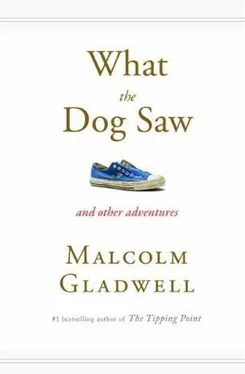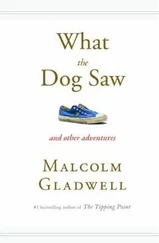When Ron came to Chicago, at thirteen, with his grandparents, he was put to work in the Popeil Brothers factory – but only on the weekends, when his father wasn’t there. “Canned salmon and white bread for lunch, that was the diet,” he recalls. “Did I live with my father? Never. I lived with my grandparents.” When he became a pitchman, his father gave him just one advantage: he extended his son credit. Mel Korey says that he once drove Ron home from college and dropped him off at his father’s apartment. “He had a key to the apartment, and when he walked in his dad was in bed already. His dad said, ‘Is that you, Ron?’ And Ron said, ‘Yeah.’ And his dad never came out. And by the next morning Ron still hadn’t seen him.” Later, when Ron went into business for himself, he was persona non grata around Popeil Brothers. “Ronnie was never allowed in the place after that,” one of S.J.’s former associates recalls. “He was never let in the front door. He was never allowed to be part of anything.” My father, Ron says simply, “was all business. I didn’t know him personally.”
Here is a man who constructed his life in the image of his father – who went into the same business, who applied the same relentless attention to the workings of the kitchen, who got his start by selling his father’s own products – and where was his father? “You know, they could have done wonders together,” Korey says, shaking his head. “I remember one time we talked with K-tel about joining forces, and they said that we would be a war machine – that was their word. Well, Ron and his dad, they could have been a war machine.” For all that, it is hard to find in Ron even a trace of bitterness. Once, I asked him, “Who are your inspirations?” The first name came easily: his good friend Steve Wynn. He was silent for a moment, and then he added, “My father.” Despite everything, Ron clearly found in his father’s example a tradition of irresistible value. And what did Ron do with that tradition? He transcended it. He created the Showtime, which is indisputably a better gadget, dollar for dollar, than the Morris Metric Slicer, the Dutch Kitchen Shredder Grater, the Chop-O-Matic, and the Veg-O-Matic combined.
When I was in Ocean Township, visiting Arnold Morris, he took me to the local Jewish cemetery, Chesed Shel Ames, on a small hilltop just outside town. We drove slowly through the town’s poorer sections in Arnold ’s white Mercedes. It was a rainy day. At the cemetery, a man stood out front in an undershirt, drinking a beer. We entered through a little rusty gate. “This is where it all starts,” Arnold said, by which he meant that everyone – the whole spirited, squabbling clan – was buried here. We walked up and down the rows until we found, off in a corner, the Morris headstones. There was Nathan Morris, of the straw boater and the opportune heart attack, and next to him his wife, Betty. A few rows over was the family patriarch, Kidders Morris, and his wife, and a few rows from there Irving Rosenbloom, who made a fortune in plastic goods out on Long Island. Then all the Popeils, in tidy rows: Ron’s grandfather Isadore, who was as mean as a snake, and his wife, Mary; S.J., who turned a cold shoulder to his own son; Ron’s brother, Jerry, who died young. Ron was from them, but he was not of them. Arnold walked slowly among the tombstones, the rain dancing off his baseball cap, and then he said something that seemed perfectly right. “You know, I’ll bet you you’ll never find Ronnie here.”
One Saturday night, Ron Popeil arrived at the headquarters of the television shopping network QVC , a vast gleaming complex nestled in the woods of suburban Philadelphia. Ron is a regular on QVC . He supplements his infomercials with occasional appearances on the network, and, for twenty-four hours beginning that midnight, QVC had granted him eight live slots, starting with a special “Ronco” hour between midnight and 1 a.m. Ron was traveling with his daughter Shannon, who had got her start in the business selling the Ronco Electric Food Dehydrator on the fair circuit, and the plan was that the two of them would alternate throughout the day. They were pitching a Digital Jog Dial version of the Showtime, in black, available for one day only, at a “special value” of $129.72.
In the studio, Ron had set up eighteen Digital Jog Dial Showtimes on five wood-paneled gurneys. From Los Angeles, he had sent, via Federal Express, dozens of Styrofoam containers with enough meat for each of the day’s airings: eight fifteen-pound turkeys, seventy-two hamburgers, eight legs of lamb, eight ducks, thirty-odd chickens, two dozen or so Rock Cornish game hens, and on and on, supplementing them with garnishes, trout, and some sausage bought that morning at three Philadelphia-area supermarkets. QVC’s target was thirty-seven thousand machines, meaning that it hoped to gross about $4.5 million during the twenty-four hours – a huge day, even by the network’s standards. Ron seemed tense. He barked at the team of QVC producers and cameramen bustling around the room. He fussed over the hero plates – the ready-made dinners that he would use to showcase meat taken straight from the oven. “Guys, this is impossible,” he said, peering at a tray of mashed potatoes and gravy. “The level of gravy must be higher.” He was limping a little. “You know, there’s a lot of pressure on you,” he said wearily. “ ‘How did Ron do? Is he still the best?’ ”
With just a few minutes to go, Ron ducked into the greenroom next to the studio to put GLH in his hair: a few aerosol bursts, followed by vigorous brushing. “Where is God right now?” his co-host, Rick Domeier, yelled out, looking around theatrically for his guest star. “Is God backstage?” Ron then appeared, resplendent in a chef’s coat, and the cameras began to roll. He sliced open a leg of lamb. He played with the dial of the new digital Showtime. He admired the crispy, succulent skin of the duck. He discussed the virtues of the new food-warming feature – where the machine would rotate at low heat for up to four hours after the meat was cooked in order to keep the juices moving – and, all the while, bantered so convincingly with viewers calling in on the testimonial line that it was as if he were back mesmerizing the secretaries in the Woolworth’s at State and Washington.
In the greenroom, there were two computer monitors. The first displayed a line graph charting the number of calls that came in at any given second. The second was an electronic ledger showing the total sales up to that point. As Ron took flight, one by one, people left the studio to gather around the computers. Shannon Popeil came first. It was 12:40 a.m. In the studio, Ron was slicing onions with one of his father’s Dial-O-Matics. She looked at the second monitor and gave a little gasp. Forty minutes in, and Ron had already passed $700,000. A QVC manager walked in. It was 12:48 a.m., and Ron was roaring on: $837,650. “It can’t be!” he cried out. “That’s unbelievable!” Two QVC producers came over. One of them pointed at the first monitor, which was graphing the call volume. “Jump,” he called out. “Jump!” There were only a few minutes left. Ron was extolling the virtues of the oven one final time, and, sure enough, the line began to take a sharp turn upward, as all over America viewers took out their wallets. The numbers on the second screen began to change in a blur of recalculation – rising in increments of $129.72 plus shipping and taxes. “You know, we’re going to hit a million dollars, just on the first hour,” one of the QVC guys said, and there was awe in his voice. It was one thing to talk about how Ron was the best there ever was, after all, but quite another to see proof of it, before your very eyes. At that moment, on the other side of the room, the door opened, and a man appeared, stooped and drawn but with a smile on his face. It was Ron Popeil, who invented a better rotisserie in his kitchen and went out and pitched it himself. There was a hush, and then the whole room stood up and cheered. [1]
Читать дальше












